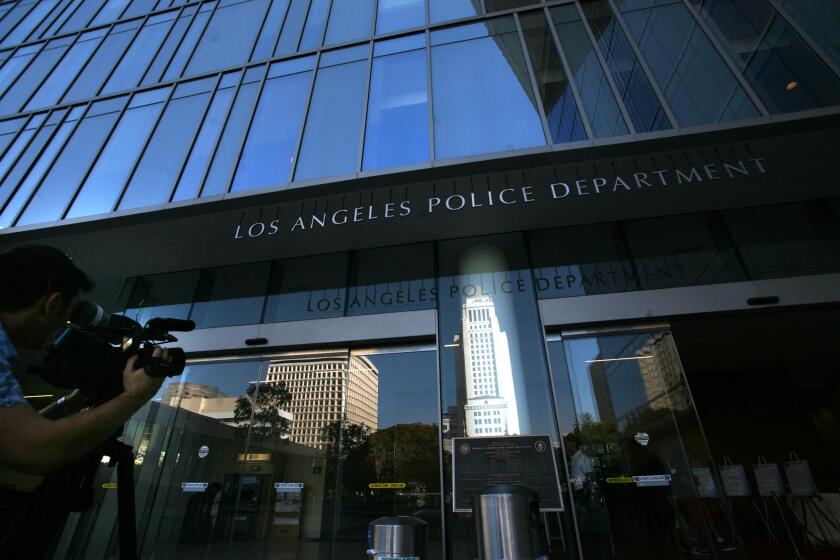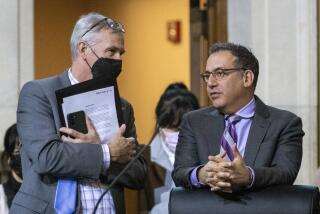Facing a huge budget gap, L.A. takes a first step toward cutting hundreds of city jobs

- Share via
The Los Angeles City Council made its first move Tuesday toward eliminating hundreds of jobs at the Police Department and other city agencies, while stopping short of a more sweeping plan that would have targeted nearly 1,900 workers.
Facing a projected $675-million deficit, council members agreed to seek new employee furloughs, drain much of the city’s reserve and borrow $150 million to cover the cost of ongoing operations. But they scaled back the portion of the budget-balancing plan devoted to job cuts, identifying 843 positions — three-fourths of them at the LAPD — for possible elimination if other cost savings cannot be found.
The package of budget-balancing measures, which passed on a 13-2 vote, decreased the number of positions targeted at the LAPD from 1,679 to 628 — 355 officers and 273 civilians. Councilmen Joe Buscaino and John Lee voted against the proposals, saying they do not want any LAPD jobs to be contemplated for layoffs.
Tuesday’s decision means that LAPD Chief Michel Moore and top managers in the city attorney’s office, the Animal Services Department and the Bureau of Engineering will need to prepare and submit lists of possible layoffs to personnel officials by Jan. 11, city budget analysts said.
Budget officials said the job cuts could be averted if department heads find new ways to cut expenses, the city receives a new federal aid package or elected officials secure another source of funding, such as concessions from public employee unions. Even when a position is eliminated, a layoff could be avoided if that employee is reassigned to another city job unaffected by the financial crisis, they said.
The council established May 22 as the layoff target date. Any decision to lay off employees would require council approval.
The flurry of budget decisions comes as the city completes its ninth month of financial crisis, which was triggered by shutdowns that followed the coronavirus outbreak. City analysts now estimate that taxes, fees and other forms of revenue will be 10% below the amount received during the previous fiscal year.
As a result, city leaders have agreed to use $259 million from its reserve funds and borrow $150 million to continue city operations.
“We are doing a series of things in this budget that, in any other year, would be an hours-long debate over how controversial they are,” Councilman Mike Bonin said.
Tuesday’s deliberations revolved largely around the question of where city leaders would find enough money to allow them to reduce the number of potential LAPD job cuts. Bonin and Councilman Curren Price said the savings should come from within the Police Department budget, not other city programs or agencies.
Price, who represents part of South Los Angeles, said the LAPD needs to be part of a “shared sacrifice” at City Hall. Many of the proposed cuts could be avoided, he said, if employee unions gave up raises or other forms of compensation.
“We need them to come back to the table to discuss real cost savings and to delay their paid increases and bonuses that were agreed upon before this state of emergency,” Price said.
Angelenos largely approve of the LAPD, but they also support Black Lives Matter and want to see some funding shifted, a Loyola Marymount study finds.
The LAPD union is scheduled to receive a 3.25% increase next month. Thousands of civilian city employees are scheduled to get raises in January and June, both of them 2%. If every raise planned over the next six months is deferred, the city would save more than $33 million, budget officials said.
The council did not support the strategy offered by Bonin and Price and instead agreed to allow city budget analysts to reduce the number of LAPD positions targeted for possible elimination using funds outside the Police Department, if necessary.
Several activists expressed alarm at the council’s budget plans, saying city leaders should cut deeper at the LAPD to reduce the number of Angelenos victimized by police brutality.
Some urged the council to revisit the People’s Budget, which was promoted this year as an alternative to Mayor Eric Garcetti’s spending plan, allocating 1.64% of the city’s general fund to law enforcement — effectively wiping out the department.
Others accused council members of capitulating to the Los Angeles Police Protective League, the union that represents roughly 9,800 rank-and-file officers. The union has poured money into the campaigns of several council members and, so far, has declined to delay any of its scheduled pay increases.
“Your hands are so tied by the LAPPL,” Stacy Dawson Stearns, a professor of performing arts, told the council.
Several council members defended LAPD spending, arguing that additional cuts would expose residents to increased crime. Buscaino, Lee and council members Paul Koretz and Monica Rodriguez tried without success to win passage of a measure to prohibit any LAPD employee from having their job considered for elimination.
Koretz argued that the number of homicides and shooting victims has grown rapidly this year, not only in his Westwood-to-Encino district but also citywide. The proposal was defeated on an 11-4 vote, with Krekorian calling it “irresponsible.”
Koretz has argued in favor of using more COVID-19 relief money, which was provided by the federal government this year to help cities weather the pandemic, to balance the budget. Portions of those funds have gone to pay for rent relief, aid to cover utility bills and initiatives aimed at addressing homelessness.
Moore said Tuesday that the LAPD job cuts, if ultimately approved by the council, could result in the closure of at least one regional jail, reduce the quality of property crime investigations and cut patrols in areas covered by the department’s Olympic and Topanga divisions.
LAPD commanders will spend the coming weeks determining which officers and civilian city workers could face the possibility of layoffs, identifying positions based on seniority, Moore said. The list will be submitted to the city’s personnel department for accuracy and to see if some non-sworn employees could be moved into other jobs, he said.
Times staff writer Kevin Rector contributed to this report.
More to Read
Sign up for Essential California
The most important California stories and recommendations in your inbox every morning.
You may occasionally receive promotional content from the Los Angeles Times.












